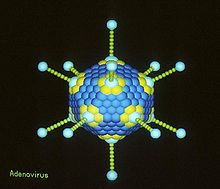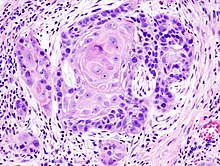Gendicine
Gendicine is the trade name of a drug for the treatment of cancer with oncolytic viruses based on a genetically modified adenovirus . It was released on October 16, 2003 by the competent authority in the People's Republic of China for clinical use in patients with tumors in the ear, nose and throat area . This makes it the world's first drug based on a gene therapy approach that has received approval for a market launch following successful clinical tests. The license for production was granted on January 20, 2004. The developer and manufacturer of the drug is the Chinese company SiBiono GeneTech.
Mechanism of action
Gendicine is based on a non- replicating adenovirus vector , with which a functional version (wild-type form) of the gene coding for the tumor suppressor protein p53 is introduced into body cells. The protein p53 is a transcription factor that regulates programmed cell death ( apoptosis ) in uncontrolled growing cells . The gene coding for p53 is mutated in around 50 percent of all human tumors . In the squamous cell carcinomas of the head and neck area examined in the clinical studies for Gendicine , a form of cancer that is particularly widespread in China, a p53 mutation is present in around 60 percent of the tumors. The introduction of the tumor suppressor gene into the tumor cells enables the expression of p53.
In addition to controlling apoptosis, the p53 protein also functions as a tumor antigen and thus stimulates the immune system to selectively destroy the tumor cells. P53 also reduces the formation of the vascular endothelial growth factor (VEGF) and other proteins that are involved in angiogenesis and thus promote tumor growth and the formation of metastases .
Since the function of p53 depends on the presence of damage to the deoxyribonucleic acid (DNA), the effects of Gendicine in healthy cells are minor according to the manufacturer.
application
By the end of 2006, around 4,000 patients had been treated with Gendicine in China. The application in the context of the previous investigations took place over a period of several weeks by weekly injection directly into the tumor. However, depending on the location of the tumor, other applications such as intravenous administration are also possible. Around 10 12 virus particles are given per injection , which, depending on the form of application, are two to ten milliliters (direct injection into the tumor), 20 to 50 milliliters ( arterial infusion ) or 100 milliliters ( intravenous infusion ) or 100 to 1000 milliliters ( infusion into the Abdominal cavity ) physiological saline solution . Approximately one hour after application, the virus particles are completely absorbed into the tumor. The expression of the p53 gene begins around three hours after application and reaches its maximum after about 72 hours, but also 14 days after injection of the virus particles still detectable. The recombinant DNA of the adenovirus vector begins to degrade approximately three weeks after application.
According to the information provided by the manufacturer, around two thirds of the patients treated with Gendicine and radiation therapy , and thus around three times more patients than in the group treated only with radiation therapy, had a total remission of the tumor after one year . Another 30 percent of the patients who received Gendicine in addition to radiation had a partial remission. In addition, according to the manufacturer's information, there are first signs of a roughly three times higher survival rate for Gendicine-treated patients and a significant improvement in quality of life compared to conventional chemotherapy . However, an extension of the survival time was not a prerequisite for approval.
The manufacturer describes the tolerance of Gendicine as good. According to these reports, the most common side effects were pain at the injection site, tiredness and, about two to four hours after application, fever attacks lasting two to six hours. For the occurrence of fever, a decrease in frequency and severity with increasing duration of treatment was described. The manufacturer cites the contraindications for use in pregnant or breastfeeding women as well as in patients with generalized infections or infection- related fevers, and the occurrence of severe fever and allergic reactions as consequences of an overdose .
Admission and criticism
The therapeutic use of p53 is the subject of worldwide research. At the beginning of 2005, around 60 further clinical studies were conducted on the use of recombinant adenoviruses with p53, which are referred to as rAd-p53 . Gendicine was approved in China on the basis of evidence of safety and fundamental efficacy in phase I and phase II studies, but unlike in Europe , the USA and other countries without the existence of completed phase III studies . The manufacturer himself referred to the data available at the time of approval as "Phase II / III studies", as the company believes that these do not include a phase III study, but above the usual phase II study Would go beyond scope. The relevant approval regulations in the People's Republic of China were changed in May 1999 so that, as in most other countries, marketing approval will only be granted after phase III studies. However, since the phase I studies for Gendicine began in December 1998 and thus before the corresponding change in the legal situation, this change did not apply to the corresponding approval process.
Another point of criticism of the approval of Gendicine is the fact that almost all relevant scientific and clinical studies have been published in Chinese-language journals. From the point of view of some critics, this makes it difficult for scientists in Western countries to check the data. There are also allegations of patent infringement by other companies, such as the American company Introgen. However, this is denied by SiBiono GeneTech. The fact that the Chinese state acts as an investor in SiBiono GeneTech in addition to its role as a licensing authority has also been criticized, as has the involvement of the company's head in drafting the approval guidelines for gene therapy drugs in China.
literature
- Wilson, JM (2005): Gendicine: The First Commercial Gene Therapy Product. In: Human Gene Therapy. Vol. 16, pp. 1014-1015. PMID 16149899 doi : 10.1089 / hum.2005.16.1014
- Peng, Zhaohui (2005): Current Status of Gendicine in China: Recombinant Human Ad-p53 Agent for Treatment of Cancers. In: Human Gene Therapy. Vol. 16, pp. 1016-1027. PMID 16149900 doi : 10.1089 / hum.2005.16.1016
- Guo, Jerry & Xin, Hao (2006): Chinese Gene Therapy. Splicing Out the West? In: Science. Vol. 314, pp. 1232-1235. PMID 17124300 doi : 10.1126 / science.314.5803.1232
Web links
- Shenzhen SiBiono GeneTech Co., Ltd. Manufacturer's website (Chinese, English)
Individual evidence
- ↑ V. Cerullo, A. Koski, M. Vähä-Koskela, A. Hemminki: Chapter eight-Oncolytic adenoviruses for cancer immunotherapy: data from mice, hamsters, and humans. In: Adv Cancer Res . (2012), Volume 115, pp. 265-318. doi : 10.1016 / B978-0-12-398342-8.00008-2 . PMID 23021247 .

